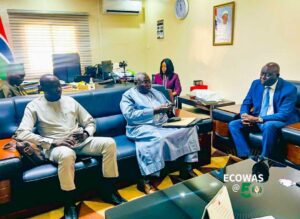ECOWAS and The Gambia Government Advance Plans for Transformative Banjul-Barra Bridge Project. By Raymond Enoch
In a strategic move to bolster regional integration and unlock economic potential in West Africa, the Economic Community of West African States (ECOWAS) has intensified consultations with the Government of The Gambia on the proposed Banjul-Barra Bridge Project.
Leading a high-level delegation to Banjul, ECOWAS Commissioner for Infrastructure, Energy and Digitalization, Mr. Sediko Douka, paid a courtesy visit to His Excellency President Adama Barrow.
The visit marked a significant step in ECOWAS’ commitment to improving cross-border infrastructure and connectivity across the region.
Commissioner Douka briefed President Barrow on the official launch of a feasibility and preliminary design study for the landmark Banjul-Barra Bridge and its accompanying 11-kilometre access road. He stressed the strategic significance of the initiative in advancing regional trade, facilitating movement, and catalyzing socio-economic progress throughout The Gambia and its neighboring ECOWAS member states.
President Barrow welcomed the initiative with enthusiasm, calling it a “long overdue” development. “This project is vital for our national and regional development. It will significantly enhance trade between The Gambia, Senegal, and Guinea-Bissau, while unlocking economic opportunities for local communities, particularly small-scale farmers and women traders,” he stated.
Highlighting the bridge’s potential to transform cross-border mobility and logistics, the President said the project would reduce travel time across the north and south banks of the country, improve agricultural supply chains, bolster national security, and promote regional integration.
In addition to his meeting with the President, Commissioner Douka, along with Mr. Abdou Kolley, Chief of Staff to the ECOWAS President, held strategic talks with The Gambia’s Minister of Transport, Works and Infrastructure, Honourable Ebraima Sillah, and technical officials. These discussions laid the groundwork for a four-day technical session set to begin from April 29th, 2025, in Banjul.
The upcoming session aims to finalize the Terms of Reference (ToR) for the feasibility and preliminary design study. Once adopted, ECOWAS will launch the procurement process to select a qualified consultant to carry out an in-depth analysis of the project’s viability, sustainability, and economic feasibility. The study will also assess the environmental, social, and security implications of the proposed infrastructure.
Expected to be completed within 12 months, the feasibility study is anticipated to serve as a cornerstone for mobilizing investor interest and transitioning into the construction phase of what is widely regarded as a flagship project within ECOWAS’ regional integration framework.
The Banjul-Barra Bridge Project represents more than a structural undertaking—it symbolizes a vision for a better-connected West Africa, where infrastructure becomes a vehicle for shared prosperity, resilience, and sustainable development.








